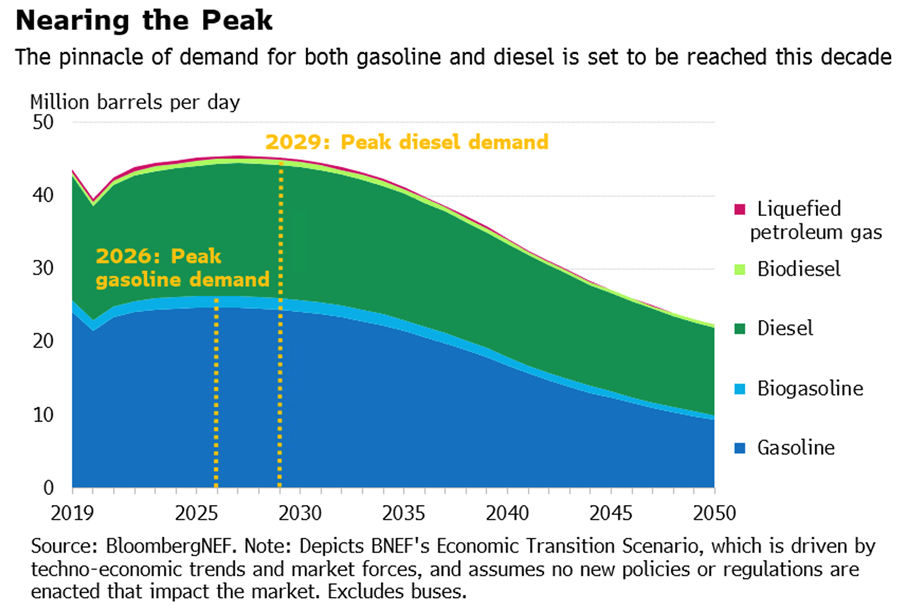In the dynamic world of energy markets, understanding gasoline options trading is crucial for anyone seeking to navigate the complexities of the petroleum industry. Gasoline options offer a flexible tool to manage price fluctuations, enabling traders to speculate on future gasoline prices and hedge against financial risks.

Image: about.bnef.com
Simply put, gasoline options are contracts that grant buyers (holders) the right, but not the obligation, to buy or sell a specific volume of gasoline at a set price (strike price) on or before a specified date (expiration). This flexibility allows traders to fine-tune their strategies, depending on their outlook on market conditions.
Types of Gasoline Options
There are two main types of gasoline options:
- Call Options: Give the holder the right to buy gasoline at the strike price. When market prices rise above the strike price, call options become valuable as they offer the opportunity to purchase gasoline below market value.
- Put Options: Grant the holder the right to sell gasoline at the strike price. If market prices fall below the strike price, put options increase in value due to the ability to sell gasoline at a premium.
Gasoline Options Trading Strategies
Gasoline options trading involves a wide range of strategies tailored to different risk appetites and market expectations.
Bullish Strategies: Assume gasoline prices will rise; traders buy call options hoping to benefit from price appreciation.
Bearish Strategies: Anticipate falling gasoline prices; traders purchase put options to cash in on price declines.
Spread Strategies: Combine multiple options contracts to narrow risk and define profit potential more precisely.
Hedging Strategies: Utilized by businesses and consumers to protect against unexpected price fluctuations in gasoline. Traders buy or sell options to mitigate their exposure to adverse market conditions.
Factors Affecting Gasoline Options Prices
Gasoline options prices are influenced by several factors:
- Spot Gasoline Price: The current price of gasoline, which sets the baseline for option pricing.
- Strikes and Expiration Date: The strike price and time until option expiration significantly impact the option’s value and risk profile.
- Market Volatility: Higher market volatility leads to more expensive options as traders demand a premium for protection against price swings.
- Supply and Demand: Changes in gasoline supply or demand can trigger significant price fluctuations and impact option values.
- External Events: Political instability, natural disasters, or major economic events can trigger price volatility and affect gasoline options pricing.

Image: zmansenergybrain.com
Benefits of Gasoline Options Trading
Gasoline options trading offers numerous benefits.
Speculation: Options enable traders to speculate on future gasoline prices, potentially profiting from price fluctuations.
Hedging: Businesses can use options to mitigate risk, protect against adverse market conditions, and ensure supply at predetermined prices.
Flexibility: Options provide traders with a wide range of strategies to tailor their risk-reward profiles to suit their needs.
Income Generation: Selling (writing) options can generate income through premiums received, even if the trader does not own any underlying gasoline.
Risks of Gasoline Options Trading
Despite its benefits, gasoline options trading poses certain risks:
Loss of Premium: If the option expires worthless, the trader loses the entire option premium paid.
Market Risk: Unexpected shifts in gasoline prices or market conditions can lead to substantial losses on options trades.
Complexity: Options trading requires a thorough understanding of its mechanics and risks to make informed decisions.
Margin Requirements: Trading options often involves margin requirements, which can amplify potential gains and losses.
Expiration: Options have a limited lifespan, and the value decays over time, particularly for out-of-the-money options.
Gasoline Options Trading
Conclusion
Gasoline options trading is a multifaceted instrument that offers opportunities for speculation, hedging, and income generation. Understanding the mechanics and risks involved is paramount for successful trading. By carefully considering market conditions, developing appropriate strategies, and embracing the inherent volatility of energy markets, traders can harness the potential of gasoline options to enhance their investment portfolios.






